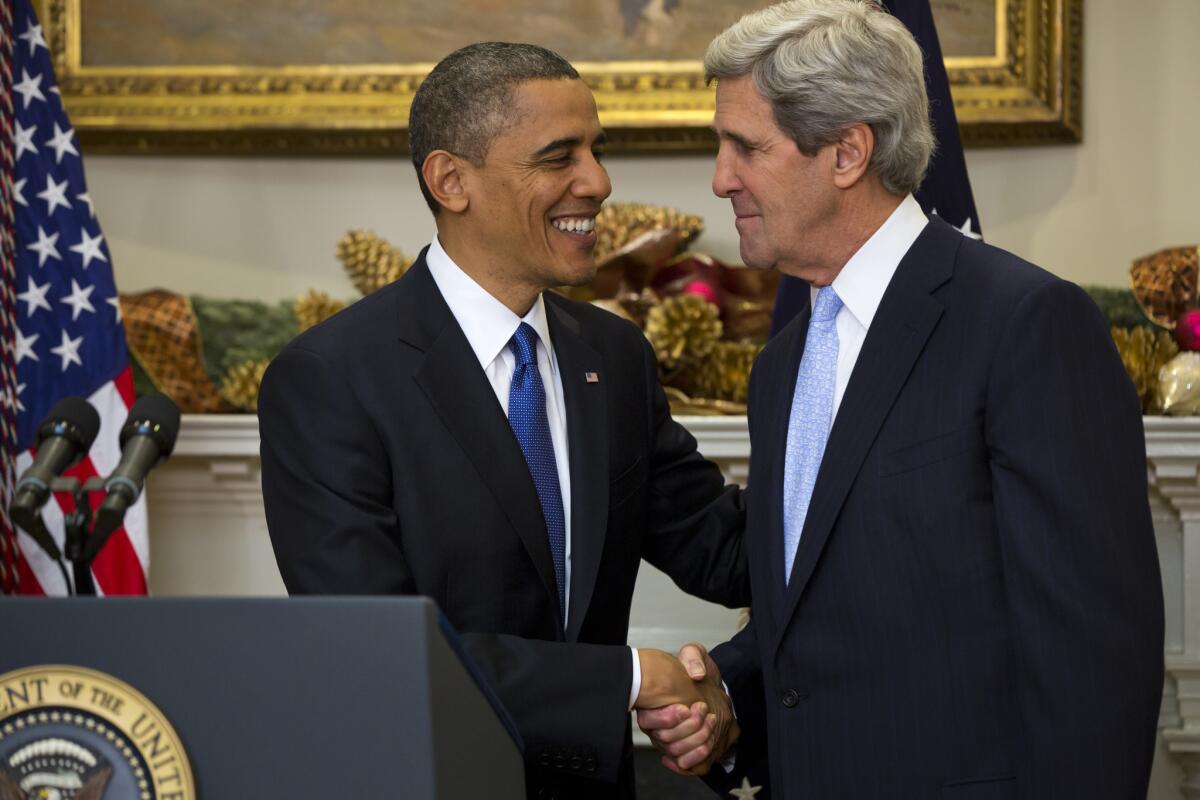Kerry’s climate change credentials

- Share via
Sen. John Kerry, President Obama’s nominee for secretary of State, may not be able to bring peace to the Middle East, end enduring trade and currency disputes with China or mend fences with all the anti-American leaders in Latin America. But he may be capable of redirecting the debate over an issue of equal or greater importance: climate change.
Kerry is among the most forward-thinking members of the U.S. Senate when it comes to understanding both the threats of and the practical responses to global warming. He’s struggled to bring along the Senate, which rejected his attempt to win passage of a cap-and-trade bill in 2010, but Kerry’s new post should give him expanded opportunities to lead.
That’s not because of the State Department’s role in approving the controversial Keystone XL pipeline to carry oil from Canada’s tar sands to refineries in Texas. Although many environmentalists see this as a defining decision in the fight against climate change, Kerry, presuming his nomination is approved, will arrive too late in that process to play much of a role. And although his expertise should prove valuable during negotiations to create a badly needed successor to the Kyoto Protocol, which the United Nations is aiming to complete in 2015, Kerry can’t force the Senate to ratify it.
PHOTO ESSAY: Seven states, seven warning signs of global warming
Yet Kerry can make a difference when it comes to bilateral efforts by the U.S. and other countries. The U.S. has already entered multiple such partnerships, including with India and China, whose rapid development threatens the entire globe. These deals, which include research partnerships on clean energy and stepped-up loans for renewable energy from the Export-Import Bank, will make only a small dent in the problem, but they should be strengthened and aggressively pursued by Kerry. He should also focus on building environmental “coalitions of the willing” — such as the Climate and Clean Air Coalition in which the U.S., Canada, Mexico, Sweden, Bangladesh and Ghana have teamed up to limit key pollutants.
The United States has a curious blind spot when it comes to climate change. An October report from Munich Re, the world’s largest reinsurer, stated that “nowhere in the world is the rising number of natural catastrophes more evident than in North America.” It went on to note that although every continent has seen an increase in weather-related disasters over the last 30 years, none surpasses our own, which has seen a fivefold increase in such phenomena since 1980. Yet despite an estimated $1 trillion in damage from these disasters, Americans have so far been unwilling to take the needed steps to head off an even worse future. Kerry won’t change that by himself. But he can be a catalyst for wisdom and reform.
More to Read
A cure for the common opinion
Get thought-provoking perspectives with our weekly newsletter.
You may occasionally receive promotional content from the Los Angeles Times.









